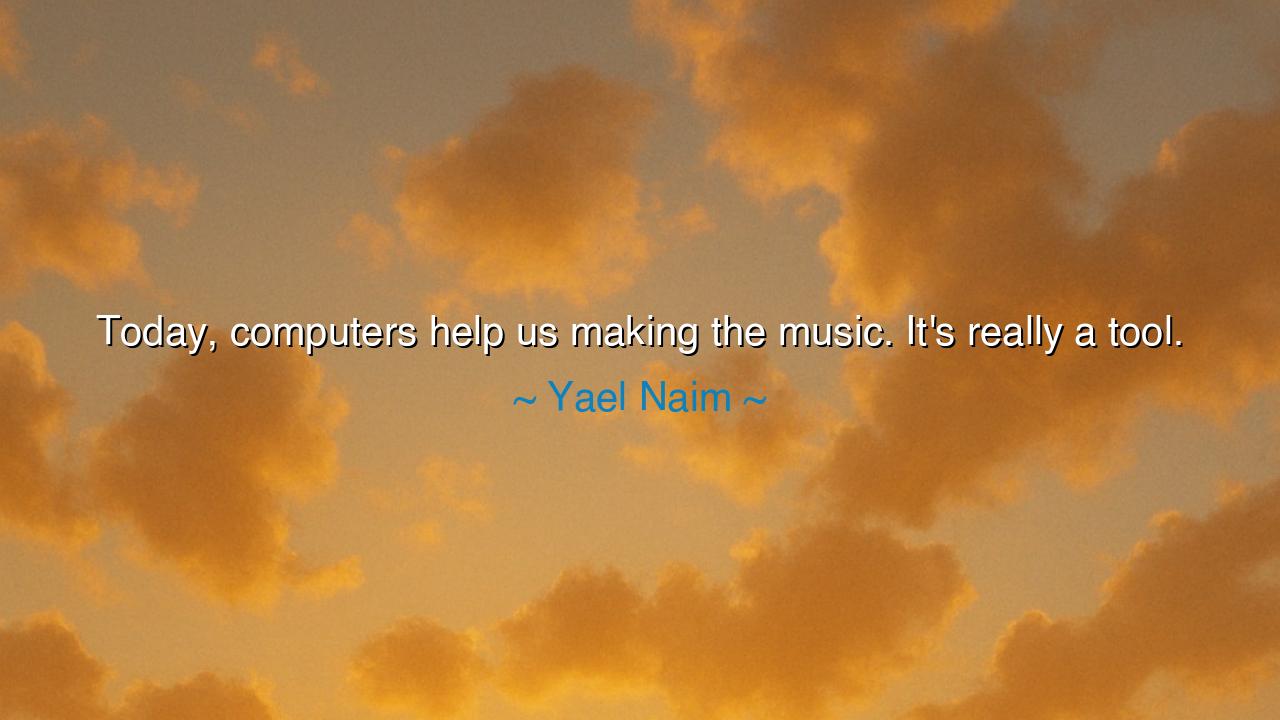
Today, computers help us making the music. It's really a tool.






“Today, computers help us making the music. It’s really a tool.” — in this simple yet profound truth, Yael Naim, the artist of voice and soul, reminds us of the delicate harmony between human spirit and technology. Her words, though calm in tone, echo the wisdom of ages past: that the instrument must always serve the musician, and never the other way around. To her, the computer is not a master nor a muse, but a tool — a vessel through which the human heart continues its eternal song.
Once, music was born only from wood, string, and breath. The lyre sang to the gods of Greece, the drum spoke to the ancestors of Africa, and the flute carried prayers to the wind. Each sound came from touch — the trembling hand, the steady rhythm of the pulse. Then came the digital age, where wires replaced veins and circuits carried melody. But Yael Naim whispers a timeless reminder: no matter how powerful the technology, it is still the heart that composes. Without feeling, sound is noise; without soul, music is machinery.
Her words recall the wisdom of the ancient craftsman. For the potter, the wheel was a tool; for the sculptor, the chisel; for the writer, the quill. None of these were worshipped — they were used with reverence but without idolatry. So too must the artist treat the computer: not as a god of creation, but as an obedient servant. The danger of the modern world lies not in the tool itself, but in forgetting its place. When the craftsman begins to serve the chisel, or the musician begins to serve the machine, art loses its humanity.
History gives us a mirror to understand her insight. When Johann Sebastian Bach composed his sacred works, he did so not with vast orchestras or grand machines, but with disciplined hands and a mind tuned to the divine. His tools were simple — a pen, parchment, and the keys of a harpsichord. Yet from that simplicity came music that still shakes the human heart centuries later. Bach needed no computer, because he understood the greatest power lies not in innovation, but in intention. What Naim teaches is not to abandon progress, but to anchor it in purpose.
Still, we live in an age where the computer has become the modern lyre — capable of summoning infinite tones, crafting symphonies from silence, and translating the imagination into sound. This is no small miracle. But even miracles must be guided by meaning. The greatest composers of today are not those who rely on machines to create, but those who command them with soul — who merge precision with passion, who let their humanity breathe through every note, no matter how digital the process.
There is humility in Naim’s words, a recognition that technology, though wondrous, does not make the artist. The tool cannot replace the touch. It cannot feel longing, or joy, or grief. It cannot tremble at the sound of its own song. That gift belongs only to the living. Thus, her wisdom serves as a quiet safeguard against the arrogance of innovation — a reminder that progress must walk hand in hand with poetry, or else it becomes sterile and cold.
The lesson, then, is clear and eternal: embrace the tools of your age, but never surrender your spirit to them. Let the computer be your ally, not your identity. The true power of creation lies not in the machine, but in the heart that commands it, in the imagination that shapes its silence into sound. Technology may amplify your reach, but only the soul gives your work meaning.
So remember, O makers of the modern world — use your tools wisely. Do not let them dull your wonder. Whether you compose with strings or circuits, let the melody begin not in your software, but in your soul. For as Yael Naim teaches, the computer may help you make the music, but the music itself — that living, trembling, eternal thing — will always belong to the human heart.






AAdministratorAdministrator
Welcome, honored guests. Please leave a comment, we will respond soon